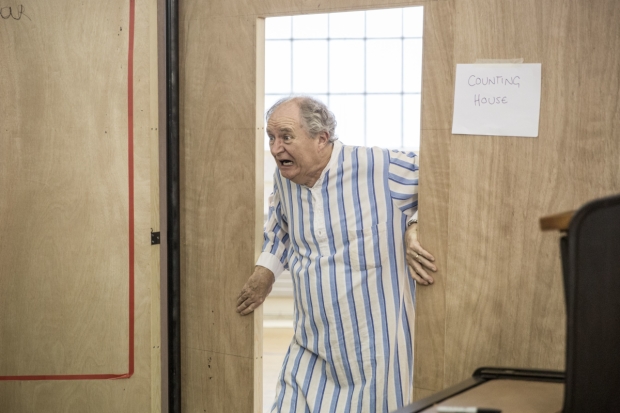Michael Coveney: It's hard to believe Jim Broadbent turned down Del Boy
Michael Coveney on the joys of actor Jim Broadbent, who is currently starring in ”A Christmas Carol”

© Marc Brenner
The last time Jim Broadbent was on the stage, at the National Theatre in 2005, he played a fruity old thespian killing off critics in Phelim McDermott‘s adaptation of the hilarious horror movie Theatre of Blood. "Critics are only human," cried one, pleading for his life; "An opinion I find myself struggling to share," sneered Jim, impaling his quarrelsome quarry on a sharp spread of spears.
Broadbent had already won his Oscar for his lovely performance as the literary critic (oh, the irony!) John Bayley, author of Tolstoy and the Novel, in Richard Eyre‘s Iris, so it’s doubly delightful to see him reunited with McDermott on his return to the stage as Scrooge in A Christmas Carol (running till the end of the month) and scene-stealing as the even more curmudgeonly Prince Nikolai Bolkonsky in the compelling new BBC compression (five more episodes to go, can’t wait) of Tolstoy’s War and Peace.
It’s getting to the point where I’m really quite disappointed if Broadbent isn’t in the latest new film. Among recent releases, he’s been a sympathetic priest, Father Flood, in John Crowley’s Brooklyn (adapted from the Cólm Toibín novel) and a slimy ex-copper, Underwood, in Nick Hytner’s The Lady in the Van (by Alan Bennett) and there are about six others pending this year, including an adaptation of Julian Barnes’s Booker prize-winning, intricately memorial A Sense of an Ending and Helen Fielding’s Bridget Jones’s Baby, in which he plays Bridget’s dad.
He’s become, as if by stealth, a national pleasure if not indeed a national treasure, and it’s hard to believe that he once turned down the chance to play "Del Boy" Trotter in BBC TV’s Only Fools and Horses (the role was unforgettably taken by David Jason), but equally possible to think that the decision was the making of him as a big screen big player. Does anyone dislike Jim Broadbent, even when he’s playing Scrooge? It’s impossible. He’s not only loved by the public, he’s inordinately admired by everyone who’s worked with him – that’s fact, not hearsay – Eyre and Hytner at the National, Mike Leigh (several movies and plays), Martin Scorsese, Woody Allen, Steven Spielberg.
Watching his Scrooge earlier this week, several things struck me; in particular, the unusual and totally characteristic mixture of charm, buffoonery and tragic heft. You expect such a big, lumbering-looking fellow to be, well, more awkward or clumsy. But he always makes the right choice in where to stand, how to react – his big face, forehead and wide eyes make him emphatically visible – how much hand and arm movement to make, and he always seems to be concentrating fiercely on what everyone else is doing.
He also makes Scrooge’s journey through his own life, bitterness and nightmare to childish longing, self-knowledge and the recognition of love as the only thing that really matters in life as moving as any Shakespearean tragedy. Scrooge, in fact, becomes a dry run for the King Lear he must deliver before too long. There’s also something tough-as-teak about Broadbent’s spiritual presence on stage, which surely has to do with coming from Lincolnshire farming stock and being educated by Quakers. His parents, conscientious objectors during the war, ran an amateur theatre, the Broadbent, which prospers to this day.
Scrooge is written by Patrick Barlow, author of the long-running The 39 Steps, with whom Broadbent first teamed in the deliriously funny two-man National Theatre of Brent. It’s this association with Barlow, and with McDermott’s Improbable Theatre, Mike Leigh and, especially, Ken Campbell – there are lots of design similarities in Scrooge to the "rough theatre" sci-fi epic Illuminatus! with which Campbell, Broadbent and Chris Langham opened the NT’s Cottesloe – that marks him out, too. He’s stamped through with the seaside rock lettering of authentic radical comedian, like some dream-like concoction of Dario Fo, Tommy Cooper and Michael Gambon; he’s a complete one-off.
I don’t think I enjoy watching any actor more these days, except possibly Bill Murray. Or Cate Blanchett. Blanchett, though, in Carol (brilliantly adapted from Patricia Highsmith by Phyllis Nagy) is tremulously sly and sensual; we’re moving away from the realms of thunder, astonishment and unforced eccentricity where Broadbent reigns supreme…and no-one is more surprised by this than Broadbent himself. As he said, to the bemusement of the Hollywood glitterati, on accepting his Oscar: "Stone the crows!"












